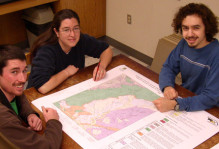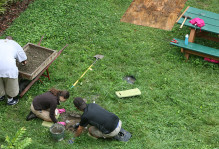Semester Endgames
Students occasionally ask me for advice about how to deal with the challenges created by the semester “endgame:” the last few weeks of each semester when term papers become due, voluminous reading needs to be completed, and final exams are conducted. Since it is now early December and the endgame once again is upon us, for what they are worth here are the pearls of wisdom I often share with students when asked about how to stay sane and productive during the waning days of the semester.
1. I couldn’t care less about your best work
During the last week of classes, it’s pretty common for students to ask their professors for extensions, perhaps claiming that they won’t be able to do their best work unless they get a little extra time. My standard response is that I’m not really interested in seeing their best work. Their “best work” is actually kind of irrelevant. W&M students are really smart and academically talented and they all have the ability to perform at the “A” level if given enough time. Instead, my interest is in their best work subject to the constraints of the deadline and the rest of their coursework. I think that the definition of success in most professional workplaces is probably the same – The brass ring goes to the people who are most effective at muddling through while getting their work in on time.
2. Staying up all night is an important life skill
As the semester winds down, I also hear a lot of complaints from students about how the crushing workload is forcing them to pull “all nighters” and work until dawn to finish papers and prepare for exams. Oh, the horror, the horror. Personally, I regularly work through the wee hours, finishing articles and book chapters for publication or getting ready for class at the last minute. And during my time as a congressional staffer, working until 3 or 4 am in preparation for hearings and committee meetings was a pretty common experience. I think that late nights are commonplace in most professional jobs. So students should view their nocturnal studying activities at W&M as yet another preparation for life after the burg. I guess that’s why Wawa never closes.
3. Every “D” counts the same
For students, time and effort are scarce resources during the semester endgame and they need to allocate these resources rationally. At least that’s what my economist friends tell me. You don’t want to spend all of your time on one paper or studying for one exam when you are enrolled in four or five classes. If the choice is between allocating your last available hour to (a) improving your grade in my American politics course from a B+ to an A or (b) raising your organic chemistry grade from a D to a B-, then the smart move is to work on chemistry even though my course readings may be a lot more fun. The increment in “quality points” is higher from focusing on chemistry. Keep in mind that, when it comes to calculating the all-important GPA, all three-credit courses count the same. And allocate your time accordingly.
4. Outline, outline, outline
Over the past two decades, I’ve read thousands of final exam essays, typically dashed off in bluebooks by sleep-deprived, stressed-out undergraduates. Not surprisingly, students often fail to write coherently until they are three or four paragraphs into their essays. Sometime, their brains are so overloaded with course details that they never really get around to addressing the essay question at all. My advice is for students to take a deep breath and formally outline their answers before they begin writing, placing the outline right before the body of the essay. The act of outlining improves the logical structure of their essays and makes it less likely that important points will enter and then mysteriously disappear from their minds during the process of writing their answers – an all to common occurrence.
5. Thou shalt leave nothing blank
OK, let’s cut the bull. In multivariate calculus or theoretical physics, it really is possible to know absolutely nothing about a question posed on a test. If you haven’t a clue what a derivative is and think that a quark is a cartoon character, then “yes,” you may as well leave that question blank and move on to the next one. But in government courses and most other social science classes, W&M students have a fair amount of germane background even if they haven’t read a page from the syllabus. They’ve had other relevant classes in high school or college and (hopefully) all of them occasionally take a look at a national newspaper. So if you don’t know the answer to a question on one of our tests, go ahead and guess and take a stab at receiving at least partial credit. Above all, don’t leave anything blank.
6. Make believe that your professors are lazy
Most of us really aren’t lazy at all, but in preparing for and completing final exams students should act as if we are for the following reasons. Keep in mind that your professors are also inundated with work during the semester endgame. Imagine what it is like to have to wade through and grade 80 or more bluebooks chock full of undergraduate prose about Beowulf, ethnic identities in the Caribbean Diaspora, the pocket veto, or some other esoteric subject. And that’s just one class. So one strategy is to make your handwriting as legible as possible, because studies indicate that student exams that are relatively easy to read tend to receive higher grades. You should write exam essays in pen because pencil lead tends to smudge, forcing the grader to work a lot harder making sense of your thoughts. Maybe place circled or underlined headings and subheadings in your bluebook essays, organizing the paragraphs into categories that bring out the analytical content for the professor. And those outlines that I mentioned earlier also help the grader understand the basic structure of your argument.
7. Remember that you’re not funny
On final exams, students often put little quips in their bluebooks or otherwise try to integrate into their answers awkward and unwelcome stabs at humor. I’ve even had students dash off doodles and cartoons; I guess the goal is to inject a little levity into the process of grading. Don’t do that. Course papers and exams are a lot of things – vehicles for integrating class material, incentives for students to do the reading, signals about the level of student understanding – but one thing they’re not is funny. My advice is to spend your time on writing as coherent and compelling a test or paper as you can and leave the humor to Jon Stewart.
8. Get by with a little help from your friends
In most graduate programs and professional workplaces, collaboration is the key to success. In law school classes, for instance, students often form study groups, dividing up cases to be outlined and analyzed. Most jobs require that employees work closely with their colleagues. There is a reason why collaborative relationships are so common and valued. They promote specialization and a division of labor, which in turn maximizes efficiency and the quality of whatever is being produced. I urge my students to work with each other in preparing papers and getting ready for exams. The “Blackboard” course sites that we use at W&M include communications features that can facilitate their efforts to organize study groups and otherwise work together in tackling assignments. I also think that students are far more likely to enjoy the process of learning when they are not working in isolation.
9. I’m not your friend
For the most part, I like my students. And I hope that they like and respect me. But we’re not friends. The relationship between a college professor and a student is primarily a professional one and the stakes to it are not trivial. Our curriculum is demanding and the associated intellectual benefits for the students are profound. Employers often comment to me about the superior writing and analytical skills of W&M graduates and I am convinced that there is a significant value added from what we do here. Moreover, the grades students earn can influence if and where they go to graduate school, and on the margin grades can affect job placement after graduation. Although professors at W&M generally go out of their way to be open, helpful, and accessible to students, the work we do is serious business and the semester endgame is more than a game.
10. Above all, don’t lose perspective
Even though coursework at W&M is challenging, stressful, and important, students need to keep in mind that no individual assignment, class, or grade will have much of an impact on the rest of their lives. Personally, I failed a course or two in college and my guess is that a lot of my colleagues on the W&M faculty also screwed up big time on occasion when they were undergraduates. We somehow survived the experience. Along those lines, students’ grades tend to steadily improve the longer they are in college. Freshmen year grades often are not very strong because students are fulfilling distributional requirements and taking a lot of courses they aren’t particularly interested in or good at. As students begin to focus on classes more germane to their interests, eventually declaring a concentration, grades tend to rise. There also is a learning curve. Students tend to get better at writing papers and taking tests the longer they are in college. In my view, it is important for all students, but especially freshmen and sophomores, not to become excessively concerned about their performances on particular assignments or in particular classes.




No comments.
Comments are currently closed. Comments are closed on all posts older than one year, and for those in our archive.